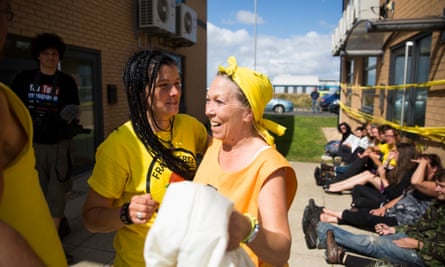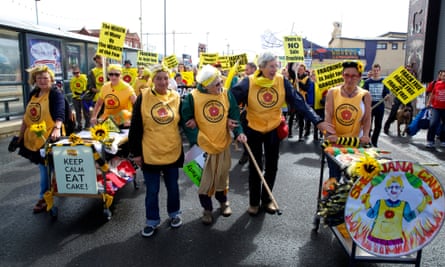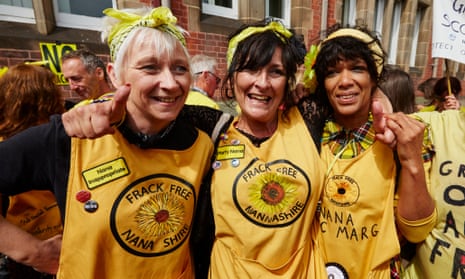If the two security guards had been awake, they probably wouldn’t have believed their eyes. Twenty-five women aged between 25 and 60, in yellow tabards and matching Hilda Ogden headscarves, vaulting a gate in order to occupy the Blackpool field that the energy company Cuadrilla had paid the guards to mind.
“Everything went smoothly, except for the logistical bits we left to the fellas,” said hairdresser Anjie Mosher, one of the group known as the Nanas, who have become the frontline against fracking in Lancashire, alongside Friends of the Earth and the Green party. The men had been tasked with arranging a van to transport the women to the field on Preston New Road in Little Plumpton, but they forgot.
“We ended up having to take taxis. The driver said: ‘Where to, ladies?’ and we went: ‘If we told you, we’d have to kill you. Just drive!’ What must he have thought of all of us, with our feather dusters and tabards, carrying cakes and bunting and tea sets at 3.30 in the morning?”
By the time the security guards woke up, the Nanas, plus a few useful dads and grandads, had pitched a tent, put up laminated signs asserting section 6 of the Criminal Law Act 1977 (better known as squatters’ rights), boiled the kettle and made themselves comfortable. Operation Mothers and Grandmas (OMG) had begun.
That was 7 August last year – a pivotal day in Lancashire’s anti-fracking movement and arguably the turning point in the county’s battle with Cuadrilla, which this week lost its planning bid to carry out exploratory fracking for shale gas on the site, along with another at Roseacre Wood near Preston.
For three weeks the Nanas, their children and grandchildren, occupied the field, drawing widespread support from the local community as well as activists from around the country. When they left, they filmed themselves hand-delivering a letter to the farmer who had rented the field to Cuadrilla, saying they were leaving, and filmed their clean-up and departure.
Yet one of their most vociferous members, Tina Louise Rothery, who stood against George Osborne for the Green party in Tatton during the general election, still ended up in court with a legal bill of £54,000 after the farmer – funded by Cuadrilla – sued her for trespass. She hasn’t paid and has no intention of doing so.

Almost 20 years after Swampy climbed a tree to protest against the building of the Newbury bypass, he remains the popular image of an environmental protester: dreadlocks, camouflage jacket, tie-dye, a grubby roll-up in one hand and juggling balls in the other. Yet many of the key players behind the Lancastrian victory this week could not be further from that stereotype.
“People want to label us, but I would always say: ‘look, I’m a twin-set and pearls lady.’ I’d never protested before in my life,” said Pat Davies, 59, an immaculately turned-out management consultant who became chair of the Preston New Road Community Group when it was set up in spring last year.
There’s a perception that anti-fracking protesters are “crusty jugglers” said Mosher. “But we are just ordinary mothers from all sorts of backgrounds who have found a common cause.”
Rebecca Fitton, a 49-year-old sculptor hadn’t thought she was the sort of person to become involved in protesting. “I didn’t think I had it in me. I didn’t have the confidence,” she said. For Karen Merritt, it was seeing other women take the lead that spurred her on. She said: “Of course there were men involved too, but the women weren’t leaving the men to do the talking. The more you see that, the more inspiring it is.”

Most of the women were prompted to get involved by the Blackpool earthquakes of 2011. A team of European seismic experts had concluded it was highly probable that the two main tremors – magnitude 2.3 and 1.5, plus aftershocks – were caused by Cuadrilla’s drilling operations at the Preese Hall-1 well in Lancashire.
Fitton and Mosher, both from Fleetwood, formed a group called FFS No Fracking (Fleetwood Folk Say No Fracking) before joining the Nanas for their occupation last August. Not all of the Nanas are “nanas”, explains Fitton, who does actually have two grandchildren.
“We chose the nan image because we like what the Lancastrian matriarch stands for: rolling her sleeves up, getting things done, but still having time for a nice cup of tea,” she said. “Also everyone listens to their nan, don’t they? If you’re in trouble with your nan, you know you’ve gone too far.” On one march she made a banner saying: “Frack with us, Cameron, and the oven gloves are off.”
Fearless but always polite, they have proved to be formidable opponents. Marie Taylor, 73, who got involved with the Roseacre Awareness Group (Rag) after the company applied for permission to drill near her house, recalls meeting Francis Egan, Cuadrilla’s chief executive.
“I said: ‘Don’t you be thinking you can come to this little village and you’re going to walk right over us – you’re trying to do something that will be very, very difficult to achieve here.’ Years ago we saw off plans to build a service station in Roseacre, I told him. He just looked at me as if to say: ‘stupid woman.’” As Barbara Richardson, Rag’s chair, puts it: “They completely underestimated the scale of the opposition.”
What characterised all of the actions and protests by these women was that they were peaceful and, they would argue, lawful. They believe their gender played a key role in their success. “Women are patient, aren’t they?” said Davies. “We always knew this would be a slow burn.”
Rothery argues that men are blinded by technology. “Men love things that go vroom. Fracking is toys for boys.” Being an older woman – she’s 53 – was an asset, she said. “I think with age you realise it’s not about looking good but acting from the heart. You reach a point where you don’t care what other people think about you.”
Pam Foster, who is in her 60s, said the pro-fracking campaigners tried to use their age against them. “At the start people would say: ‘Oh, you’re all old. You’re going to die soon. Leave the jobs for us.’”
But the women were undeterred, spurred on by each other and history. During the Preston New Road occupation last year, Janice Buckley, 55, said she was confident they would win. She said: “Women have done it before – I don’t see why women can’t do it now. Don’t forget the suffragettes.”
They might have won the battle at Lancashire county hall, but the Nanas are not putting their tea sets away yet. “We don’t want to lose this momentum – or our friendships,” said Foster. The women want to put their might behind community renewable solutions, such as solar energy.
They also know that Cuadrilla may well appeal against the decision, and have pledged to support groups in other counties should energy companies apply to frack there. “We know that the government is all out for shale and we are all out to stop them,” said Mosher. “We will keep dusting off our tabards and waving our feather dusters.”








Comments (…)
Sign in or create your Guardian account to join the discussion